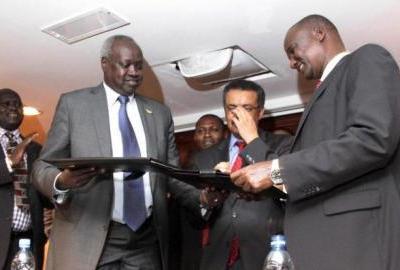S. Sudan rival factions endorse new ‘IGAD Plus’ initiative
By Tesfa-Alem Tekle
June 11, 2015 (ADDIS ABABA) – South Sudan government and armed opposition group (SPLM-IO) have endorsed proposed inclusion of new players to the Intergovernmental Authority on Development (IGAD) – led peace process aimed to end the long-running conflict in the youngest African nation.

The two warring factions of government led by president Salva Kiir and opposition faction of SPLM-IO led by former vice president, Riek Machar, endorsed the IGAD-Plus initiative on Wednesday after IGAD engaged their respective lead negotiators – Nhial Deng Nhial of the government and Taban Deng Gai of the rebel side – in a three-day consultation meetings in the Ethiopian capital, Addis Ababa.
The new IGAD-Plus initiative will now incorporate the African Union, the UN, EU, China and the Troika (UK, US, Norway).
It will also include five African countries (South Africa, Nigeria, Algeria, Chad, and Rwanda) each representing different blocs of the continent, which will all participate actively under the IGAD’s expanded mediation process.
Negotiators have confirmed that the two sides have accepted the new IGAD-Plus mechanism without any objection. They also submitted their respective proposals for further negotiations once the talks resume per a date yet to be announced by IGAD.
Sources close to the consultation meeting however told Sudan Tribune that IGAD seems to hold on to its proposed position which will give government 53%, SPLM-IO 33% and other political parties plus former detainees 14% of power sharing at the national level.
For the three regions or the ten states in the country, IGAD gives 100% to the government in Bahr el Ghazal and Equatoria regions while divides power in Upper Nile region by proposing a reverse of 53% for SPLM-IO, 33% for government and 14% for other political parties and former detainees.
SPLM-IO leader would appoint three governors for Unity, Upper Nile and Jonglei states, who will form the state governments. Upper Nile region is the richest part of the country that produces oil which provides 98% of the country overall budget.
SPLM-IO has been opposed to the proposal, saying the issues that brought about the conflict involve the whole country and not only Upper Nile region that needed the change and demanded that the power-sharing and reforms should apply across the country.
Critics also said the government was trying to limit the struggle for change in the country as exclusively a thing of the Upper Nile region, but added this strategy would also encourage further rebellions in the other regions in order to be recognized.
They also said government’s strategy was to limit the influence of the rebel leader in the other two regions of Bahr el Ghazal and Equatoria.
Officials in Addis Ababa on Thursday told Sudan Tribune that IGAD chief mediator, Seyoum Mesfin, has left to South Africa to attend the African Union summit where South Sudan will be discussed.
On the sidelines of the continental summit, the IGAD mediation team will hold separate meeting with leaders of the five selected African countries (South Africa, Nigeria, Algeria, Chad, and Rwanda) where it will address the latest developments achieved from consultation meetings in Addis Ababa.
IGAD mediators and the leaders of the five countries will also consult on new negotiating mechanism and possible ways forward to stalled talks.
They will further set a new timetable for resumption of next round of peace talks and are said to announce the new schedule from South Africa, Sudan Tribune understands.
The two South Sudan’s conflicting parties are given till 9 July to form a transitional government of national unity however political analysts doubt the deadline will be met.
Both sides have yet to form an internationally-mandated power-sharing government and have to bridge a number of remaining contentious issues in less than one month time. During their three-day meeting in Addis Ababa chief negotiators of both sides expressed commitment to bring peace to the country.
South Sudan government lead negotiator Nhial Deng Nhial, told opposition negotiators it was about time to demonstrate political will to bring lasting solution than drive the nation for “self-serving purposes.”
Nhial added that president Salva Kiir had given him the go-ahead to engage the SPLM-IO and the other stakeholders in frank and honest consultations so that “we can set the agenda of negotiations.”
The rebel negotiators to their side called on Juba to engage in a genuine dialogue and realize military solution was “too unrealistic” to solve the crises.
The last round of South Sudan peace negotiations collapsed on 6 March after rival leaders failed to agree on almost all outstanding issues.
IGAD and the UN have threatened with sanctions but that hasn’t yet been implemented.
According to UN, recent fighting in South Sudan’s Unity and Upper Nile states have displaced at least 100,000 people and blocked humanitarian aid deliveries for some 650,000 people.
Civil war in South Sudan erupted in mid-December 2013 and since has killed tens of thousands and displaced some two million South Sudanese.
(ST)
